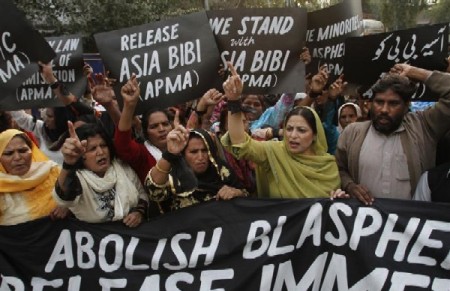US Gave $8B to Pakistan While Christian Mother Asia Bibi Was Imprisoned and Sentenced to Death; ACLJ Wants Aid Stopped in Petition

The American Center for Law and Justice has started a petition asking the U.S. government to stop sending foreign aid to Pakistan, the country that recently upheld the death sentence for Christian mother Asia Bibi for blasphemy. Figures have shown that the U.S. sent close to $8 billion to Pakistan in the past five years while Bibi has been imprisoned.
"We must stop sending billions of our taxpayer dollars to nations that persecute Christians. It's that simple. Not one more dime for persecution. Cut off American foreign aid to any country that persecutes Christians," reads the petition, which has close to 40,000 signatures as of Tuesday morning and is addressed to Congress and President Barack Obama.
"As a wave of persecution sweeps across the Middle East — and Christians flee for their lives — it's time for the money to stop," it adds. "Already there is growing support for basic human rights and basic common sense on Capitol Hill."
The $8 billion estimate by the ACLJ is consistent with figures presented by the Center for Global Development. The research organization states that the 2009 Enhanced Partnership for Pakistan Act has allowed close to $7.5 billion in aid to be sent to the South Asian country over the past five years, aimed at improving governance and economic growth.
Bibi, a Christian woman and mother of five children, was first sentenced to death in 2010 for an incident where she was accused of blaspheming against Islam by a group of Muslim women. Despite a global campaign calling for Bibi's release, the Lahore High Court upheld her sentence earlier in October.
Bibi's hopes now lie with Pakistan's Supreme Court. The International Christian Concern told The Christian Post last week in an interview that there are good reasons to hope that the Supreme Court will decide to overturn the death penalty.
"I think the chances of the Supreme Court overturning the death sentence are much greater than that of the High Court. In many cases, especially blasphemy cases, court decisions are influenced, either by ideology or threats, by local radical groups. Generally, the High Court is more insulated from this influence," William Stark, ICC's regional manager for South Asia, told CP.
He speculated that the high profile nature of Bibi's case might have influenced the judges to hand down a decision that would not anger the radical groups, however.
Stark also agreed that the U.S. government could help the Christian mother by applying pressure on Pakistan, especially given the international aid it sends to that country.
"Having the U.S. government call on Pakistan to uphold international human rights standards as part of receiving aid shouldn't be that far-fetched," he said.
The minority Christian population in Pakistan has rallied behind Bibi, with leaders calling on authorities to reverse the sentence. Haroon Barkat, director of the Masihi Foundation, a group working to protect Christians from blasphemy laws, added that "international pressures and mobilization can be useful" in influencing the case.
Barkat said that above all, "the political will of the government and of the highest authorities in Pakistan is needed" to put an end to the many false blasphemy cases in the country.





















